Mildred D. Taylor (Ethiopia) — our finest “Young Adult” writer
Over the years there have been a number of very good RPCV writers who served in Ethiopia. Most notables are Dick Lipez (1962-64), writing detective mysteries at Richard Stevenson; literary novelist & English professor Mark Dinenfass (1964-66); award winning short story writer Kathleen (Johnson) Coskran (1965-67); Dan Close (1968-71) who is still writing historical novels; and Roberta Worrick (Ethiopia 1971–73) writing as Maria Thomas. Roberta died tragically in a plane crash in the mountains of western Ethiopia in 1989. She is remembered on our site, Peace Corps Writers, by having the fiction award given in her name.
There is another former PCV writer from Ethiopia — Mildred D. Taylor — who over these years has been overlooked by 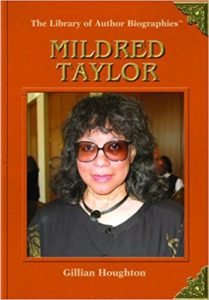 our Peace Corps Community. This is my fault. I knew this sweet woman when I was her APCD in 1966 –67 in Ethiopia. She was just out of college and a Peace Corps teacher in the southern Ethiopian village of Yirgalem.
our Peace Corps Community. This is my fault. I knew this sweet woman when I was her APCD in 1966 –67 in Ethiopia. She was just out of college and a Peace Corps teacher in the southern Ethiopian village of Yirgalem.
I remember her as being someone who caused no trouble, made no demands on anyone, and was a silent observer of the cluster of other PCVs in town, some of whom were real ‘characters.’
One of those ‘characters’ was Mary Lou Duffy (1964-66). She was famous for taking care of homeless Ethiopian students. The PCVs in town called these kids, “Duffy’s Dozen.” Mary Lou would go back home to Rochester, NY and eventually became a bank VP. That was always a stretch for me, knowing this kind and gentle woman when she was just twenty two. She wasn’t the type, I could imagined, that might someday be running a board room.
But then I also didn’t realize what a great writer Millie Taylor would become.
Millie Taylor attracted no notice from the Peace Corps Staff. She did her job and left Ethiopia without anyone realizing what a literary star she would become.
What I also didn’t know was that by the time Millie arrived in Ethiopia, she had already written a novel. At the age of 19 she wrote Dark People, Dark World, the story of a blind white man in Chicago’s black ghetto, told in the first-person. Publishers were interested in the book but Millie disagreed with the revisions they wanted and the novel was never published.
So, she graduated from the University of Toledo, went to Ethiopia to teach English and history, and when she came home again, she worked as a Peace Corps recruiter and also did training of new PCVs for Ethiopia.
Next, she enrolled at the University Of Colorado School Of Journalism and earned a Masters, then moved to LA in 1971 to write full time and support herself by doing temporary editing and proofreading.
She also married and had a little girl while living in California.
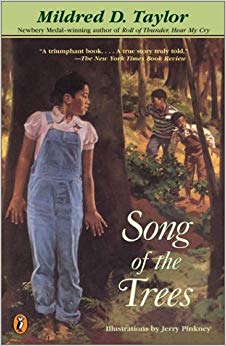 Her life and career, however, were changing. In 1973, she entered a contest sponsored by the Council on Interracial Books for Children. Her book, Song of the Trees, won first prize in the contest’s African-American category and was published by Dial Books in 1975. The New York Times listed it as an outstanding book of the year.
Her life and career, however, were changing. In 1973, she entered a contest sponsored by the Council on Interracial Books for Children. Her book, Song of the Trees, won first prize in the contest’s African-American category and was published by Dial Books in 1975. The New York Times listed it as an outstanding book of the year.
This book, about the Logan family, was the first in a series of nine novels based on stories from her own family’s history. One of her best known, Let the Circle Be Unbroken, was nominated for the 1982 National Book Award and received the Coretta Scott King Award in 1983.
Millie was born in Mississippi in 1943 but raised in Ohio. She grew up immersed in family stories. As a child, Taylor visited her great-grandfather’s house in the South, built at the turn of the past century, a house that didn’t have running water or electricity. Memories of those visits found their way into her family stories, most notably Roll of Thunder, Hear My Cry, the 1977 Newbery Medal winner. Taylor’s stories reveal struggles, racial tension, and tragedy, as well as triumph, pride, and family honor.
She had done it. Her writing career was not only launched. She was a writing star.
In 2006, Nancy J. Johnson a professor of English education at Western Washington University and Cyndi Giorgis an associate professor of children’s and young adult literature at the University of Nevada/Las Vegas interviewed Millie for Book Links.
Here Millie talks about her family, writing, and her career as a YA author.
How did you begin writing for children?
I had been trying to write stories for years that were based on narratives told by my family, and everything was always rejected. A friend of mine told me about a contest that was sponsored by the Council on Interracial Books for Children. The story I submitted was one I had previously written from several points of view [eventually published as Song of the Trees]. I tried writing it from a boy’s point of view because the story was based on my father’s life, but that didn’t work. So I decided to retell it from the girl’s point of view. It won that honor and got my foot in the door.
Was your father a storyteller?
He was a great storyteller. The whole family used to tell stories. Whenever we went south to visit relatives, I heard stories. All of my books are based on something that happened to a family member or a story told by a family member, or they are based on something that happened to me when I was growing up.
Do you hear your father’s voice when you write? Does that propel your own writing?
It really does, because I was never an outspoken child. I was always quiet. But when I’m writing a story, I hear the voices—maybe not my father’s voice—but I always hear the characters, they way they talk and how they express themselves.
What do you remember about writing Roll of Thunder, Hear My Cry ?
I was married and living in Los Angeles while writing that book. My mother had to have surgery so I went home. I 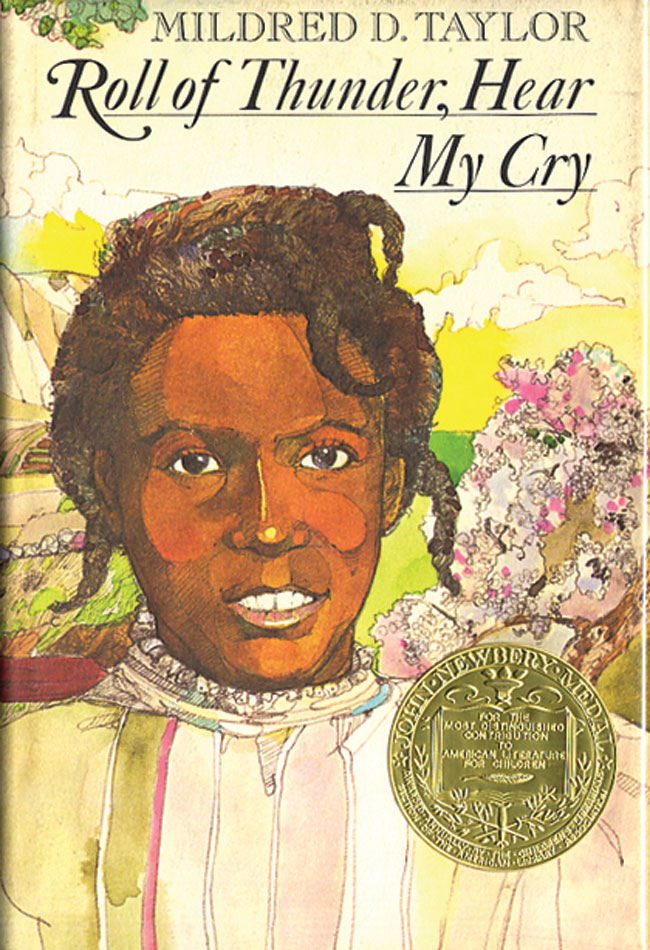 was writing the last chapters at that time. The intensity of those chapters made writing them very difficult. I was worrying about the book when a song came to me, which was Roll of Thunder. I had prayed over the book because it was too hard. When the song came I ran upstairs and told my father, “You’ve got to hear this.” I sang the song for him—everything came through in that song. I told him that day, this book is going to win the Newbery. Unfortunately he did not live to see it published. I knew it was going to be a breakthrough book. It will always be the most special book I have written.
was writing the last chapters at that time. The intensity of those chapters made writing them very difficult. I was worrying about the book when a song came to me, which was Roll of Thunder. I had prayed over the book because it was too hard. When the song came I ran upstairs and told my father, “You’ve got to hear this.” I sang the song for him—everything came through in that song. I told him that day, this book is going to win the Newbery. Unfortunately he did not live to see it published. I knew it was going to be a breakthrough book. It will always be the most special book I have written.
What compels you to continue writing family stories?
In addition to family, I write about history because I was very affected by it as a child. When I was in school, many people did not know about the true history of black people in America. Both my mother’s and father’s families owned land. They’d had land since the 1800s. I wanted to tell the truth about what life was like before the civil rights movement.
Which of your books stands out when you think of today’s readers?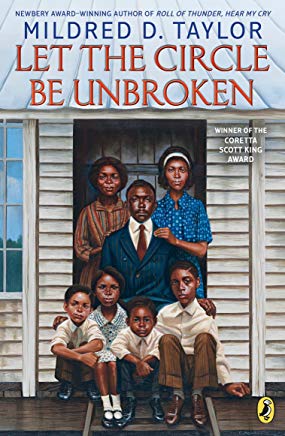
I get letters from teenagers who love The Road to Memphis and Let the Circle Be Unbroken. What readers are drawn to is the family and the fact that the characters grew up during hard times. Also, they like the romances in those books. I think they are learning many positive things about black people, in addition to what life was like and what people had to endure.
How about responses from readers? Is there one that lingers?
 A boy once wrote to me but did not reveal whether he was white or black. What was moving was that he said my work could be noted as a contribution to the civil rights movement. He said if it were not for my books, he wouldn’t know what the civil rights movement was about. My books gave a face to it and now he understands why there is a Martin Luther King Day.
A boy once wrote to me but did not reveal whether he was white or black. What was moving was that he said my work could be noted as a contribution to the civil rights movement. He said if it were not for my books, he wouldn’t know what the civil rights movement was about. My books gave a face to it and now he understands why there is a Martin Luther King Day.
Another letter arrived just a couple of weeks ago. It’s handwritten and says: “I am 87 years old and can hardly see. I have just finished listening to Roll of Thunder, Hear My Cry. It is the best thing I have ever heard. I sat up late each night to hear the tape from our library. Thank you so very much for the great story. I live in Mississippi and remember well the era of your book. Thank you so much for writing it.” It brought tears to my eyes to know what I have written affects people of so many different generations.
Mildred D.Taylor is a example of a Peace Corps Volunteer who has made a difference. A difference not only in Ethiopia as a teacher, but here at home as a creative writer.
•
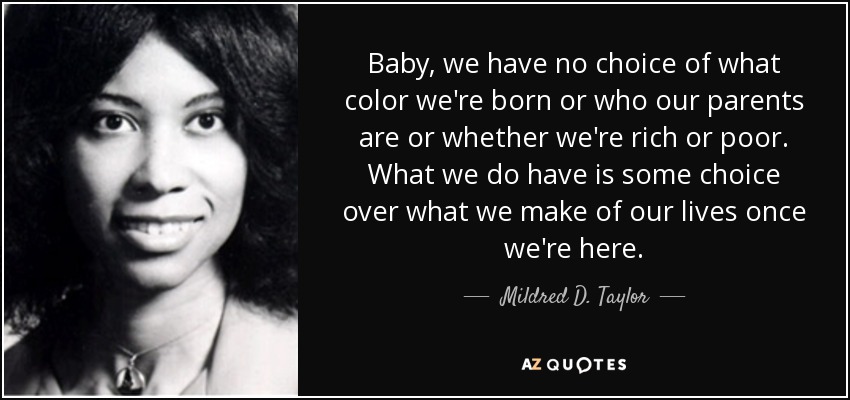
Thank you, John, for this lovely description of Mildred Taylor and her substantial contribution to American literature. I have read her wonderful books, and have written her fan letters in my head, but never mailed them. Millie and I trained together and I ended up two towns south of Yirgalem, in Dilla, so we occasionally saw each other on holidays. I had no idea she was a writer and story teller and was so happy to discover her books when my children were the right age to read them.
Did Roberta Worrick die in the plane crash that killed Mickey Leland (1989)? That was a profound tragedy that I remember even as a kid – big news in Houston. I was very surprised when I arrived in Addis Ababa to find there is a boulevard named after him.
Yes, Andrew, same plane. She was with her husband who worked for USAID. Both of them had been PCVs when they had a child. It was an ‘attempt’ by the Peace Corps in the late 60s/early70s to have families in the agency. She was brought along, I’m told, because of her good Amharic skills.
[…] Viking Books for Young Readers, peacecorpsworldwide.org […]
Thank You!
I have been a fan of Roll of Thunder Hear My Cry ever since reading it out loud to my daughters over 10 years ago.
Although I admired it on my school’s Newberry list, I did not read it growing up.
Recently, I downloaded and listened to it on audibles. I again loved the story, the message and the hope for continued improvement as a people and a nation.
I wanted to learn more about the author that created such a meaningful and powerful message.
Thank you for this article.
This is a wonderful window into the person that penned one of my favorite stories. She is an author that I honor and respect even more after reading your article.
PS
This information, with her interview, has motivated me to purchase Mildred Taylor’s other books. More depth into her stories are just what I need and want.
Thanks Again!
[…] http://mwp.olemiss.edu//dir/taylor_mildred/ https://peacecorpsworldwide.org/mildred-d-taylor-our…/ This entry was posted in Uncategorized on February 15, 2021 by […] on the Mississippi Writers’ Page.